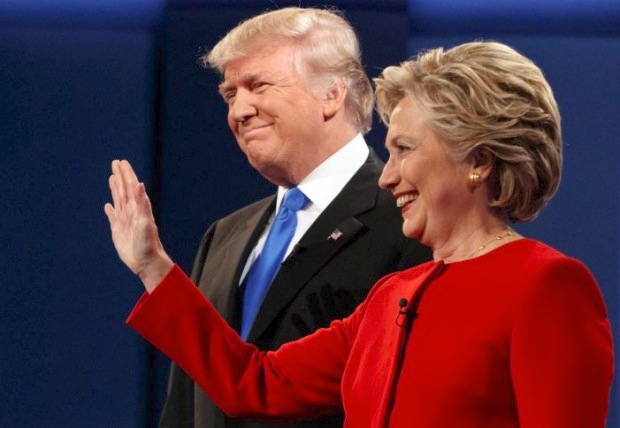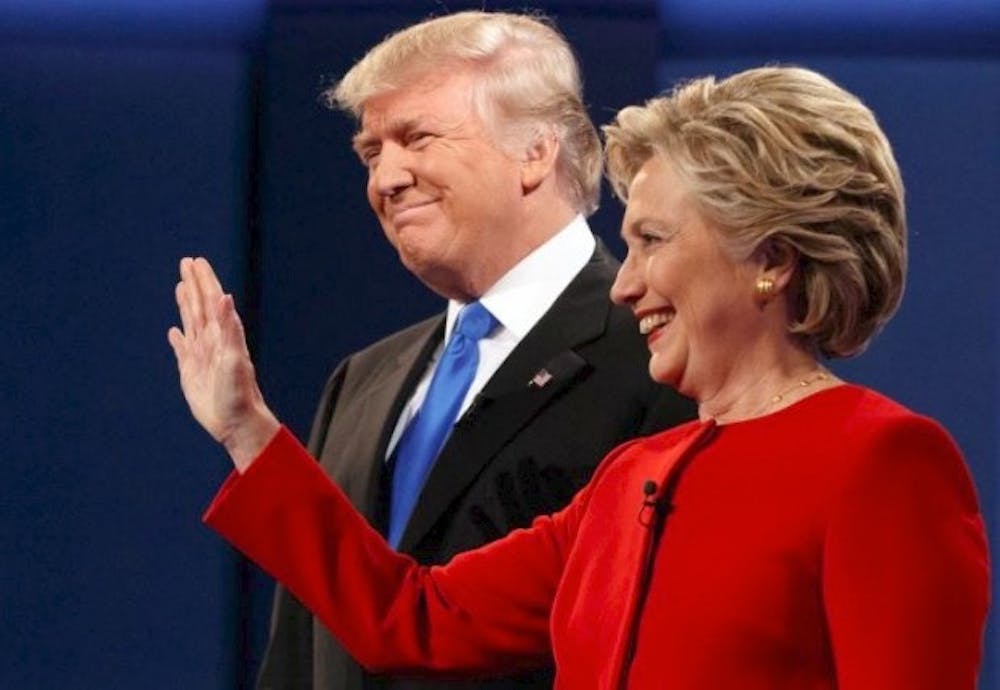By Thomas Infante
Reviews Editor
Those who pass by Loser Hall can see a large wooden billboard that has “Free Expression” painted across the top. Throughout the multitude of messages, one was written much larger than the others, stretching across the entire board in all capital letters: “BUILD THAT WALL.”
The 2016 presidential election has been a contentious one and is the first presidential election in which current students at the College are able to vote. However, many are simply too bewildered to even form a real opinion about the candidates.
According to a Wall Street Journal poll in April 2016, Donald Trump and Hillary Clinton are the most unpopular presidential candidates in history. More than 50 percent of registered voters have a negative view of both candidates, with Trump only marginally more unlikeable than Clinton.
“It’s a disgrace that they are the face of our nation,” sophomore finance major Sam Doyle said. “Neither of them did a good job of projecting a positive image.”
Views like these are frequent among students, a demographic that often seems too jaded to care about the election. Sophomore psychology major Matt Baginski said he does not plan to vote in the upcoming election.

“I don’t feel good enough about either candidate to vote for them,” Baginski said. “I watched the debates and neither of them have any charisma that connects with me. I’d rather not be involved at all.”
When asked about their favorite presidents of all time, both Doyle and Baginski listed John F. Kennedy, mostly due to his outgoing and personable character, they said.
In past elections, it was rare to have one candidate that was largely disliked, let alone two.
“Trump is intolerable,” sophomore finance major Kate Galgano said. “He represents the opposite of all the progress we have made in society. He constantly contradicts himself when he talks. The president shouldn’t be lying all the time.”
The media has heavily criticized Trump throughout his presidential campaign, which usually results from his remarks that tend to alienate certain groups of people. Meanwhile, Clinton’s political controversies ruined many voters perception of her before the election even began.
“She seems overtly corrupt,” said Tom Munnia, a sophomore business law major. “She wants to be president because she craves power, not because she represents the people.”
Many students with liberal values find themselves sorely missing Sen. Bernie Sanders of Vermont, who found strong support among college students before losing in the Democratic Primary.
When asked about him, the most common adjective students used to describe him was “genuine.”
“It felt like he was really looking out for us,” Galgano said. “He would have been a better choice, but really, I would be happy with anybody but the actual candidates.”
Despite the poor outlook on both candidates, students had equally little faith in third party candidates.
“Gary Johnson means well, but he can’t garner enough support to bother voting for him,” said Christopher Shaffer, a sophomore management and philosophy double major. “Right now, third parties are just novelties, but I would be willing to vote for a better third party candidate when the political landscape is ready for change.”
Either Trump or Clinton will be the next president of the United States, which may be comforting comforting to some, but not to others.
“I don’t think you can reasonably criticize someone for choosing not to vote this time around,” said Malcolm Luck, a sophomore marketing major. “Both candidates are just so bad.”
Despite the overwhelming despondence felt about this election, some students are optimistic that our nation is strong enough to withstand any potential president. Of those optimistic people is Ryan Jones, president of the College Republicans and a senior Spanish and political science double major.
The College Republicans is committed to promoting conservative political values, and Jones expressed little interest in his party’s candidate.
“I knew from the beginning that he would go far,” Jones said. “He’s vocal and very good at getting attention from the media. He billed himself as a champion of the Republican party opposing the Democrats.”
Jones himself does not consider Trump to be the voice of the Republican Party.
“Our voices are the ones that truly do matter,” Jones said. “Politics is all a conversation, and it’s important that we are all represented in that conversation. It’s important to express how we feel about what’s going on in the U.S. and how we should move forward.”
The current Republican party is less unified in ideology than it has been in the past, as there are several schools of thought with varying priorities, like libertarianism.
“There is definitely discord within the party of how specifically to move forward from here,” Jones said. “Before the primary, the entire spectrum of conservatism was represented in the potential nominees. Even in our club there was no clear favorite.”
Even after such a volatile election season, Jones remains eager to participate in such an extraordinary time in American history.
“It’s exciting to take part in such a crazy election,” Jones said. “Both parties have had their share of controversy. The rhetoric being used now is much different than ever before — very little is kept secret. No one will be 100 percent satisfied with this election. What’s important is that we learn from it.”
Jones hopes that this election is a wake up call for people to become more involved in government, even at a local level.
Dillon McNamara, vice president of the College Democrats and a junior political science major, shared similar sentiments.
“It’s important that we spread political awareness, especially on campus,” McNamara said. “Many college students feel disenfranchised by the current system and, as a result, they don’t care.”
McNamara and Jones both emphasized the symbiotic relationship that exists between the College’s Republican and Democratic clubs. Although each organization promotes its respective values, their main goal is to spread awareness and increase political involvement.
“About 75 percent of students on campus are registered to vote,” McNamara said. “But we don’t know how many actually go out and do it on Election Day.”
According to McNamara, the College Democrats support was divided between Clinton and Sanders before the primary. Although McNamara is confident in Clinton as a president, he is concerned with her public perception.
“I never bought into the ‘evil’ narrative that some like to portrayal of her,” McNamara said. “She’s had her share of lapses in judgment, but she’s not horrible. You don’t have to like 100 percent of a candidate to see the long-term value in voting for them.”
With a similar view of Clinton, Sam Fogelgaren, a senior history and urban studies double major, is president of TCNJ Political Union, which works toward helping people register to vote and becoming politically engaged.
“Being politically engaged opens up a lot of doors, in terms of how your country works,” Fogelgaren said. “It’s the most important thing one can do to actually make a difference.”
Fogelgaren said the current political landscape contributes to our general indifference toward politics.
“Hyper-partisanship has fully bloomed in recent years,” Fogelgaren said. “The divide seems more intense than ever before.”
Fogelgaren cites a multitude of factors that contribute to this divide.
“This election is testing our idea of truth,” he said. “When you have a candidate that invents his own truths, the media is unsure how to proceed. In addition, many people trust poor sources of news and often spread false information from those sources through social media, where it continues to spread.”
According to Daniel Bowen, a professor of political science, this divergence only worsens as hyper-partisanship spreads.
“One of the causes of polarization is the discouragement of moderate candidates,” Bowen said. “Now more than ever, there are larger gaps between red and blue states. We as voters need to allow our politicians to compromise and support moderate candidates.”
Bowen said he is more concerned about the precedent being set by this election than the candidates themselves.
“The reality of the situation is scary,” Bowen said. “I worry about the norms being broken by this election. There is so much hostility and distrust, and all the talk about a rigged election is damaging to our democracy.”
Despite the conflicting opinions, many people believe their vote matters.
“Your vote matters both on principle and in actuality,” Fogelgaren said. “It’s not just about winning, but how much one wins by. Winning by a larger margin will cause one to govern with more confidence.”
Although his view of both main candidates is largely negative, Luck sees a silver lining to the situation.
“This election has broken the stigma that presidents have to be perfect,” Luck said. “Now that both of them are so flawed, it might set a new precedent for how we judge candidates in the future.”







